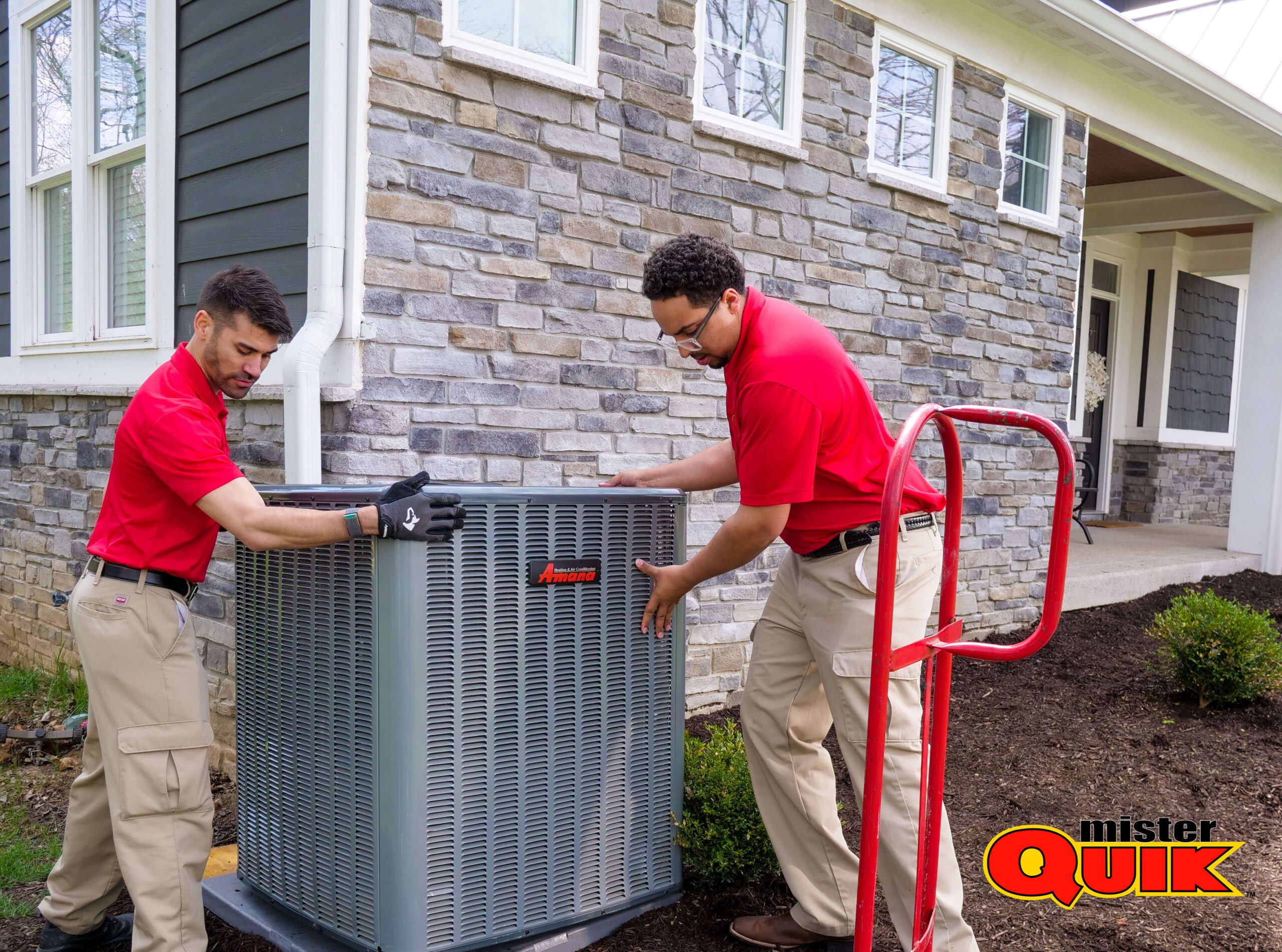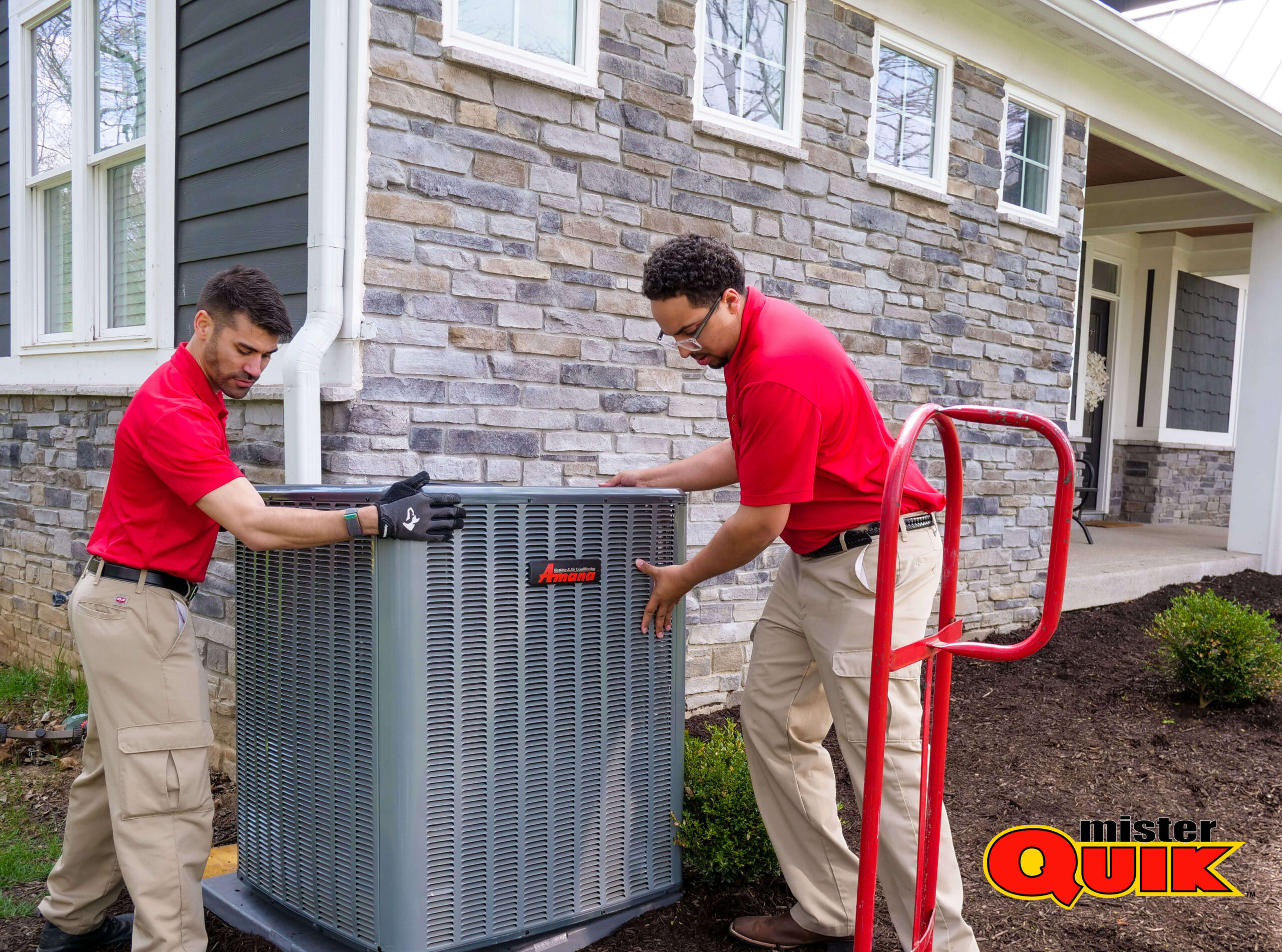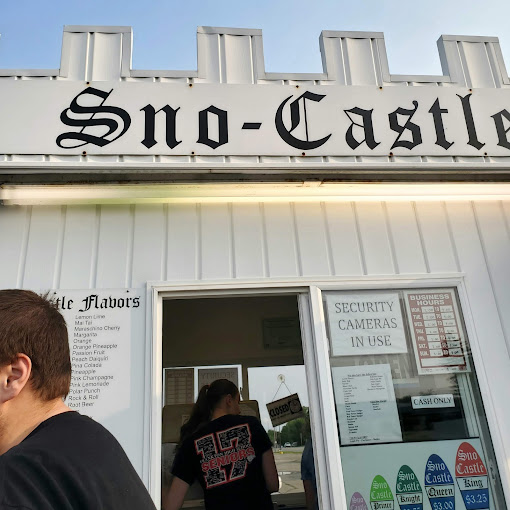Anderson HVAC Replacement
Schedule on your own without making a call. Click the button below to get started!

Common HVAC Problems in Anderson
When it comes to your home’s comfort, dealing with HVAC issues can be a real headache. In Anderson, several common problems might signal it’s time for an HVAC replacement. Here’s what you need to know:
- Frequent Breakdowns: If your HVAC system is constantly breaking down, it could be a sign of worn-out components or aging equipment.
- Poor Air Quality: Noticeable dust, allergens, or unpleasant odors circulating in your home can indicate a failing HVAC system unable to filter and circulate air effectively.
- Inconsistent Temperatures: Rooms that are too hot or too cold, despite adjusting the thermostat, may indicate inefficiencies in your HVAC system’s performance.
- Increased Energy Bills: A sudden spike in energy costs without a corresponding increase in usage often points to an HVAC system struggling to maintain efficiency.
- Strange Noises: Unusual sounds such as banging, clanking, or whistling coming from your HVAC unit could signal mechanical issues that require attention.
- Old Age: If your HVAC system is over 10-15 years old, it may be nearing the end of its lifespan, making replacement a more cost-effective solution than frequent repairs.
When facing these issues in Anderson, it’s crucial to consider Anderson HVAC Replacement services. By upgrading to a new, efficient system, you can enjoy improved comfort, energy savings, and peace of mind knowing your home is properly heated and cooled. Don’t let HVAC problems disrupt your comfort any longer—reach out to experts for professional assistance.
Knowing When to Repair or Replace HVAC
When facing HVAC issues in Anderson, determining whether to repair or replace your system can be challenging. Here are key factors to consider:
If your HVAC system is over 10-15 years old, replacement may be more cost-effective in the long run, as older systems tend to become less efficient and require frequent repairs.
Constant repairs can add up quickly. If you find yourself calling for repairs often, it might be more economical to invest in Anderson HVAC Replacement services rather than continuing to patch up an aging system.
Newer HVAC systems are designed to be more energy-efficient, which can lead to significant savings on your utility bills over time. Compare the energy efficiency ratings of your current system with newer models to determine potential savings.
If your HVAC system struggles to maintain comfortable temperatures or if you notice uneven heating or cooling throughout your home, it may be a sign that replacement is necessary to ensure consistent comfort.
The lifespan of a heating, ventilation, and air conditioning (HVAC) system can vary depending on factors such as usage, maintenance, and quality of installation. On average, HVAC systems typically last between 15 to 25 years. However, individual components within the system, such as the furnace or air conditioner, may have different lifespans. It’s essential to have regular maintenance performed on your HVAC system to maximize its efficiency and longevity. If your HVAC system is approaching the end of its lifespan or experiencing frequent issues, it may be time to consider replacing it.
Age absolutely matters when it comes to HVAC. According to a study, if your air conditioning unit is older than 10 years and/or your furnace is older than 15 years, it’s time to consider a replacement.
If you run your air conditioner and find that warm air or no cool air is blowing out, then you know you have a problem. Your HVAC system may have an issue with the compressor. Another reason could be an issue with refrigerant. Refrigerant may be leaking or low.
An electric air source heat pump is the best option if you’re looking into upgrading HVAC systems in your home and you want the most energy-efficient option.
During the replacement process, you can expect that the old unit is to be removed and disposed of properly. New ductwork may be installed. Your home’s electrical and/or gas lines may need to be updated.
HVAC Replacement Services Near Me
When searching for HVAC Replacement services near Anderson, here’s why hiring professionals is your best choice:

HVAC professionals have the knowledge and experience to assess your needs accurately and recommend the best replacement options tailored to your home.
Professional HVAC technicians ensure that your new system is installed correctly, maximizing its efficiency and lifespan.
Improper installation of HVAC systems can pose safety risks. Hiring professionals ensures that all safety protocols are followed, protecting your home and family.
Many HVAC manufacturers offer warranties that require professional installation for validity. Hiring professionals ensures that your new system is covered under warranty for added peace of mind.
Professional installation and calibration of your HVAC system ensure optimal efficiency and performance, leading to lower energy bills and improved comfort.
HVAC professionals can recommend HVAC Replacement options tailored to your specific needs, taking into account factors such as budget, home size, and desired features.
Expert HVAC Replacement Specialists Near Anderson
When searching for expert HVAC Replacement specialists near Anderson, consider these tips to find the right professionals for the job:

Look for HVAC specialists who are licensed, bonded, and insured. This ensures they have the necessary training and qualifications to handle HVAC Replacement services safely and effectively.

Take the time to read online reviews and testimonials from previous customers. Positive reviews and high ratings can indicate reliable and trustworthy HVAC specialists.

Seek recommendations from friends, family, or neighbors who have recently had HVAC Replacement services done. Personal referrals can provide valuable insights into the quality of service provided.
Cost of HVAC replacement in Anderson
When considering the cost of HVAC replacement in Anderson, it’s essential to understand the factors that influence pricing. Here are key points to consider:
1. System Size
The size of your home and its heating and cooling needs significantly impact the cost. Larger homes generally require more extensive HVAC systems, leading to higher installation costs.
2. Energy Efficiency
Opting for a more energy-efficient HVAC system may have a higher upfront cost but can result in long-term savings on energy bills.
3. Ductwork Requirements
If your existing ductwork is incompatible with the new system or needs modification, additional costs may be incurred for ductwork adjustments or replacements.
4. Equipment Quality
The quality and brand of the HVAC unit influence the overall cost. High-quality, reputable brands may have a higher upfront cost but often come with better warranties and increased reliability.
5. Labor Costs
Installation labor costs can vary based on the complexity of the job, the time required, and the expertise of the HVAC professionals.
Best time for HVAC replacement
Determining the best time for Anderson HVAC Replacement can optimize your comfort and savings. Consider these factors:
Schedule HVAC replacement during spring or fall when demand is lower. This can lead to faster service and potentially lower costs.
If your HVAC system is showing signs of aging or inefficiency, don't wait for a breakdown. Proactively replacing it before it fails can prevent discomfort and costly emergency repairs.
Upgrading to a new HVAC system before extreme weather hits can ensure optimal performance when you need it most, whether it's heating during winter or cooling in summer.
HVAC companies may offer discounts or promotions during slower seasons. Keep an eye out for special offers to save on your replacement.
Coordinate HVAC replacement at a time that's convenient for you and your family. Consider factors like work schedules, vacations, or special events to minimize disruption.
By strategically timing your Anderson HVAC Replacement, you can ensure a smooth transition to a more efficient and reliable system while maximizing comfort and savings for your home.
- Determine if the HVAC system is over 10-15 years old.
- Assess if the system frequently breaks down or shows signs of wear.
- Compare energy bills to previous months or years for sudden spikes.
- Consider the energy efficiency ratings of the current system versus newer models.
- Note any inconsistent temperatures throughout your home.
- Pay attention to any unusual noises coming from the HVAC unit.
- Calculate the cost of frequent repairs versus the expense of a new HVAC unit.
- Determine if repair costs are approaching or exceeding half the price of a new system.
- Schedule replacement during off-peak seasons like spring or fall.
- Plan proactively to avoid emergency breakdowns and take advantage of potential discounts or promotions.









